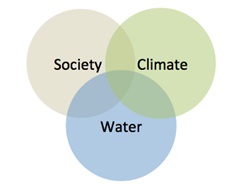By Guest Blogger: Andrea Brunelle, Chair, Department of Geography
The University of Utah currently has faculty members conducting research in the areas of society, water and climate; however, our faculty themselves identified this area as a research focus where some strategic hires could transform our productivity.
With support from the university administration we identified this nexus of research areas as an opportunity for the development of a research cluster. Enhancing our strength in this area at the University of Utah will allow us to contribute to solving important issues facing the Western US and many other regions around the world. Growing stronger in this area also means that we will broaden our ability to train undergraduates and graduates to lead society towards sustainable water solutions in a changing world.
 Water is the key limiting resource for human development and for ecological and agricultural productivity in the Western US, and in many parts of the world. Climate change, water availability, and air quality are closely linked. Climate change will bring increased temperatures combined with likely increases in the severity, frequency, and duration of weather extremes, such as droughts and floods. Changes in water availability due to climate change will be further complicated by use of water for agriculture, changes in land use, and population growth. Elevated temperatures can also increase the production and concentration of photochemical oxidants, which has serious implications for human health. Furthermore, increased air pollution can affect the longevity of snowpack which affects water storage and resources. Climate change will have important ecological impacts, including changes in species distribution and ecosystem function, insect disturbance, and wildfire activity. Emissions from wildfires adversely impact air quality in downwind locations. In many regions of the world, issues centered on climate change and water availability will profoundly shape society in the next century. Addressing these issues requires a focused, transdisciplinary effort from scientists with expertise in society, water and climate.
Water is the key limiting resource for human development and for ecological and agricultural productivity in the Western US, and in many parts of the world. Climate change, water availability, and air quality are closely linked. Climate change will bring increased temperatures combined with likely increases in the severity, frequency, and duration of weather extremes, such as droughts and floods. Changes in water availability due to climate change will be further complicated by use of water for agriculture, changes in land use, and population growth. Elevated temperatures can also increase the production and concentration of photochemical oxidants, which has serious implications for human health. Furthermore, increased air pollution can affect the longevity of snowpack which affects water storage and resources. Climate change will have important ecological impacts, including changes in species distribution and ecosystem function, insect disturbance, and wildfire activity. Emissions from wildfires adversely impact air quality in downwind locations. In many regions of the world, issues centered on climate change and water availability will profoundly shape society in the next century. Addressing these issues requires a focused, transdisciplinary effort from scientists with expertise in society, water and climate.
Eight departments (Geology & Geophysics, Geography, Economics, Political Science, Atmospheric Sciences, Anthropology, Civil and Environmental Engineering and Biology) from four colleges (College of Social and Behavioral Science, College of Science, College of Mines and Earth Science, and College of Engineering) are collaborating on these hires.
Nearly 400 applicants applied for the five advertised positions. Twelve on-campus interviews are currently underway. After our first round of colleagues are hired we plan to hold a retreat with folks from across campus to map our path forward with regards to developing a roadmap for taking advantage of new funding opportunities and on campus collaborative efforts. We will follow the lead of the Families and Health Cluster and bring in leaders in the field to nucleate the existing and new researchers on campus around the planned initiatives.
More information about the cluster and positions can be found at: http://www.utah.edu/faculty/swc/.

